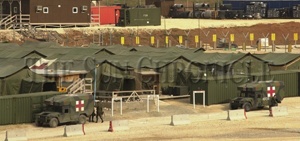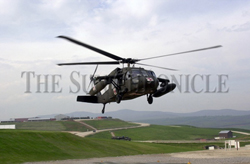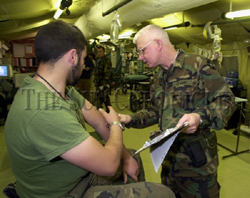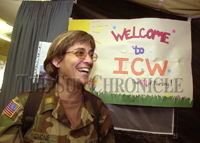Operation
Kosovo
photos
by Keith Nordstrom
HATE
STOPS AT HOSPITAL
BY CRAIG BORGES / SUN CHRONICLE STAFF
 CAMP
BONDSTEEL, Kosovo - The hate and mistrust between ethnic
Albanians and Serbians astounds many here, even those
soldiers who have made the conflict between Kosovo and
it's dominate neighbor, Serbia, their focal point of
study for the past six months.
CAMP
BONDSTEEL, Kosovo - The hate and mistrust between ethnic
Albanians and Serbians astounds many here, even those
soldiers who have made the conflict between Kosovo and
it's dominate neighbor, Serbia, their focal point of
study for the past six months.
But tucked away in a jumble of tents and makeshift buildings
here at Camp Bondsteel, ethnic barriers fall and hatred,
like a heavy and tattered overcoat that has long slipped
out of fashion, is checked at the door, hopefully for
good.
This is Task Force Medical Falcon, a field hospital
at Camp Bondsteel that has been run by the U.S. Army
Reserve's 399th Combat Support Hospital out of Taunton,
since March.
Here, all are treated equally - ethnic Albanians and
Serbs alike. Albanian is spoken here, as is Serbo-Croatian.
Here there is no time or room for things like Balkan
politics, Balkan revenge or Balkan history.
Danica Nikolic, a Serb from the Kosovo town of Riniluk,
knows this first hand as does Adem Zeka, an ethnic Albanian
from the village of Begunc, near the municipality of
Vitina.
Misfortune has brought both people here, Nikolic, for
her 11-year-old daughter Sanja, who suffered an appendicitis
attack late Friday night, and Zeka, for his 11-year-old
nephew Pajtim, who underwent an operation to correct
a colon defect he has suffered with since birth.
"There is no difference here," Mrs. Nikolic
says in Serbo-Croatian through a translator, her hands
gesturing to Zeka and his nephew. "That boy, my
daughter, they are both innocent of the horrible things
that were done. Hopefully we'll get together and forget
all the bad things. Children aren't guilty."
The physicians responsible for making these two children
right again included Maj. J.C. Cortiella, who as a civilian
works at the University of Massachusetts Medical Center
in Worcester, Maj. .Tim Counihan, also of the UMass
Medical Center, and Maj. Thomas Cataldo, a Worcester
native who now works in New Jersey. All are members
of the 399th.
"We are pleased, very lucky to have this happen,"
Zeka, Pajtim's uncle, says in Albanian through the translator.
"The boy lived on only juices for 10 years. He
could not defecate because it was so painful. He is
fine now. The doctors here made this possible."
This was the second operation for Pajtim. Kosovar doctors
in Pristina carried out the first, which consisted of
putting the boy on a colostomy bag. But even basics
are difficult to get here in the ruins that are Kosovo.
Finding the bags the boy needed, proved nearly impossible
for his family. That's when a KFOR civil affairs officer
who had met the family, made the operation at Bondsteel
possible.
Under KFOR rules, civilians can be treated at the camp
hospital only if there is a threat to life, limb or
eyesight, so civilians tend to be a small part of who
the unit here works on.
U.S. soldiers and those from other KFOR nations are
the most common patients.
---------------
It's early Sunday evening and the word is passed down
- a chopper is coming in with a shooting victim. Initial
reports indicate a Serb soldier has been shot in the
back.
The 399th members swing into action.
Drs. Cataldo, Counihan, Cortiella, along with the Boston
Celtics' doctor, Col. Arnold Scheller and Norfolk, doctor,
Col. Gregory Quick, get ready.
EMTs, nurses and technicians prepare the emergency and
operating rooms.
 Within
15 minutes the whir of a UH60 Blackhawk medical helicopter
is heard and suddenly appears overhead, it's heavy blades
causing a mini windstorm on the ground as the pilot
brings eases it onto a landing pad opposite the hospital's
front doors.
Within
15 minutes the whir of a UH60 Blackhawk medical helicopter
is heard and suddenly appears overhead, it's heavy blades
causing a mini windstorm on the ground as the pilot
brings eases it onto a landing pad opposite the hospital's
front doors.
Three EMTs and a translator don headphones and run in,
crouching to escape the powerful gusts caused by the
chopper's blades. They pull a bright orange stretcher
carrying a large blondish man from the 'copter's back
bay and rush back under the spinning blades, off the
pad and in through the ER's swinging doors.
Inside, doctors, nurses and EMTs surround the man, shouting
orders and working frantically to stabilize him. The
front of his t-shirt is blotted with blood.
Moments later X-ray technician, Specialist Faith Patterson
of Dorchester, rushes into the ER. Doctors order a chest
x-ray on the spot. She carries out the order with a
portable x-ray machine and then the man is rolled across
the hall to be operated on.
------------
Hours later, Army investigators report the man wasn't
a soldier, but a Serb civilian. He had been shot twice
in the upper body while sitting in a restaurant called
Café 99 in the city of Vitina, east of Camp Bondsteel.
The man, investigators said, jumped on his bike and
peddled a short distance to a Serb church being guarded
by soldiers in the U.S. Army's 1st Battalion, 325th
Airborne Infantry Regiment of the 82nd Airborne Division.
They got him to the help he needed. Investigators suspect
an ethnic Albanian did the shooting.
But these are details few care at the 399th care about.
A shooting victim is a shooting victim. They announce
his condition, critical but stable.
-----------
 It's
Saturday night and a Spanish Army ambulance speeds into
Bondsteel. Inside, three Spanish soldiers sit dazed,
victims of an SUV rollover somewhere in the countryside.
It's
Saturday night and a Spanish Army ambulance speeds into
Bondsteel. Inside, three Spanish soldiers sit dazed,
victims of an SUV rollover somewhere in the countryside.
Spanish Army nurses Ana Castro Marquez and Maria Garcia
Vergara, with the help of two burly ambulance drivers,
rush the soldiers in to a waiting Col. Quick.
Quick goes to work, evaluating each man for broken bones
or concussion. Later, he reports they suffer only bumps
and bruises.
Col. Quick, a former ER doctor at Norwood Hospital,
is quiet and reserved. He welcomes the opportunity to
discuss the work the 399th is doing. He says he prefers
it, in fact, over talk about the number of soldiers
and rebels the 399th has had to patch up, or see die,
since arriving.
Anyone suffering life-threatening injuries in the American
Sector usually ends up at Bondsteel.
So far the 399th has seen it's share of bloodshed, ranging
from British soldiers killed and wounded in a helicopter
crash as well as a landmine explosion, to ethnic Albanian
rebels shot during confrontations with both U.S. soldiers
and troops from other armies.
But the how and why behind the injuries don't interest
him. It's ER work and the team here is excellent at
it, he says.
"It's fun, exciting," he says. "There's
plenty to do, but it's not like an ER in the United
States. There's not that steady stream of people coming
in. It comes in spurts. We can be flat out and jammed
in here, then it will be quiet for hours on end."
Quick's wife Kitty, a former Foxboro, resident, works
as a nurse at Fuller Hospital in South Attleboro. The
Norfolk couple has three children, 21-year-old Katie,
17-year-old Pattie and 11-year-old James.
Being away from his family is difficult, he says, but
e-mail has made the separation so much easier.
"Technology has really changed things like this
in so many ways," he says. "Digital photos,
emails, phone lines. It's a big difference from years
ago."
Quick's family has practice, too. Quick much of last
year much further away from them than Kosovo, serving
as a doctor for Raytheon scientist working in Antarctica.
He says his family doesn't necessarily his overseas
adventures, but knows it's his job, his passion.
Quick says the thing he finds most interesting about
his stint here is being able to work with multinational
physicians.
"It's so international here. It's very appealing,"
he says. "You've got Greek, Australians, Russians,
Poles, so many different groups that make it so interesting."
---------
 Getting
a better appreciation for different cultures is something
Maj. Gloria Vignone enjoys about her stint here in Kosovo.
Getting
a better appreciation for different cultures is something
Maj. Gloria Vignone enjoys about her stint here in Kosovo.
Vignone, who is charge of the wound care center at Sturdy
Memorial Hospital in Attleboro, leads the Intermediate
Care Ward here at Bondsteel. Her job, she says, is to
mentor enlisted soldiers.
The Johnston, R.I., resident has been with the 399th
for 12 years. She says the work here can be excessive
- 12-hour days, six to seven days a week, but it has
given her a new appreciation of all that she has in
the United States.
"It's sad out here, really," she says. "The
people have nothing and we have so much."
------------------------------------------------------------------------
Copyright 2001
The Sun Chronicle